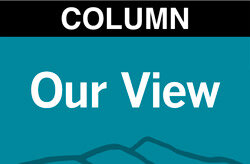
A proposed bill regarding the Colorado Open Meetings Law (COML) is under consideration by the Colorado General Assembly. Under the COML, it is “the policy of this state that the formation of public policy is public business and may not be conducted in secret.”
We realize that many people may not care about the COML, but you should care, because elected officials should not be conducting the public’s business behind closed doors in executive session unless it is allowable by law and that executive session notice properly informs the public about what will be discussed.
While we believe local public bodies should not be afraid to discuss public issues in public, there are some good reasons for going into executive session and those reasons are clearly defined by law. There are simple guidelines for announcing those sessions and for making motions to enter into executive session. It really isn’t hard to give the public some detail as to why a board is entering into an executive session.
Why would legislators want to weaken that requirement?
Why is it so hard?
We believe that if it is too complicated for local public officials to follow the law, they shouldn’t hold their positions.
When entering into executive session, they should tell you exactly why they are closing the public out of hearing them discuss matters of importance to all of us.
However, instead of complying with a pretty simple law, some feel compelled to change it.
This poorly written bill comes on the heels of numerous local public bodies across the state violating COML and being challenged in court. Many of those entities have been forced to pay attorney fees for violations or they settled out of court. We are not sure if these violations were done out of ignorance or willfully committed, but these boards were not doing what should have been done to provide the required transparency regarding the discussion of the public’s business.
The violations of these entities has hurt them in the pocketbooks, which has finally made them pay attention.
Now they want to create a way to sidestep those violations instead of just following the law.
This proposed bill was apparently written in an effort to keep those entities out of court and to scare anyone who might challenge illegal executive sessions by threatening to stick them with the entity’s attorney fees.
HB23-1259 would allow for “a local public body’s right to cure a violation of the open meetings law for an executive session, adding prerequisites for a person to challenge a violation by a local public body of the open meetings law for an executive session, and permitting a local public body to recover costs and attorney fees in an action for a violation by a local public body of the executive session provisions if the prerequisites are not met or if the local public body has cured the violation.”
Local public bodies should not need to cure violations of the COML. There should be no violations to begin with. The law is easy enough to comply with in the first place. This bill only weakens the current law.
This bill also gives local public bodies unlimited opportunities to screw up and fix it later if they find their actions challenged.
Yes, sometimes mistakes are made, but we believe this bill allows for intentional violations of the COML.
We find it interesting that our law-making legislature would even consider changing a current law in order to give local public bodies a do-over when they violate the law.
We cannot think of any laws that give citizens that same privilege.
What these public bodies need is training and instruction to avoid breaking the law. Most of our public entities belong to professional organizations or have attorneys on call to help them stay aligned with the law. Many boards have trainings for new members such as when the Pagosa Springs Town Council had someone from its insurance company come to town to provide training for members of all of its boards and committees.
Many boards have written scripts available to read before entering executive sessions to guide in proper procedures for convening executive sessions.
With bipartisan support, some expect HB23-1259 to easily pass. Instead of trying to hide things from the public who voted our elected officials into office, we believe they need to keep transparency at the forefront.
We have witnessed numerous violations of the COML over the years. The COML is very simple. It is easy to follow. Our representatives should not erode the strength, the purpose or the importance of the law.
Terri Lynn Oldham House